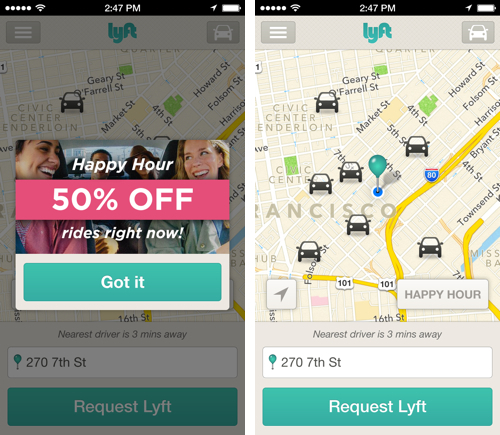Innovations In Ride-Sharing: Lyft Introduces The Opposite Of Surge Pricing
 One of the controversial features of car-summoning app Uber is that the company modulates supply and demand for rides with surge pricing. Think about all of the times that it’s hard to get a cab: Uber solves this problem by hiking rates, incentivizing drivers to stay on the road, and incentivizing people without money to take the bus. This approach is controversial, and competitor Lyft is seeking attention by doing the exact opposite.
One of the controversial features of car-summoning app Uber is that the company modulates supply and demand for rides with surge pricing. Think about all of the times that it’s hard to get a cab: Uber solves this problem by hiking rates, incentivizing drivers to stay on the road, and incentivizing people without money to take the bus. This approach is controversial, and competitor Lyft is seeking attention by doing the exact opposite.
Well, kind of. Lyft is a by-the-people, for-the-people ridesharing service that competes with Uber’s similar UberX service. Uber drew bad publicity by raising prices as much as 800% during catastrophic winter storms. The thing is, Lyft runs things the same way: they just don’t raise fares quite as much, and while they raise prices as much as 25% during what they call “Prime Time,” the company doesn’t take their customary cut of that money. Like Uber’s surge pricing, the goal is to incentivize drivers to go where the demand is so they can earn extra cash.
Every business has lulls, and what Lyft announced today is their service that’s the opposite of Prime Time – discounts for times that are slow. Appropriately, this is called Happy Hour, with discounts of 10 to 50% off rides at these off-peak times.
Lyft Is Now the Most Affordable Option at All Times [Lyft official blog]
Want more consumer news? Visit our parent organization, Consumer Reports, for the latest on scams, recalls, and other consumer issues.

